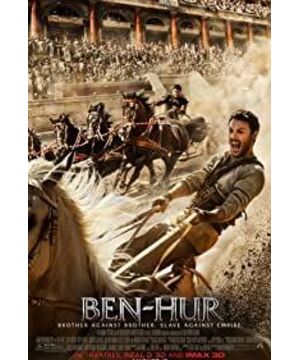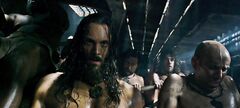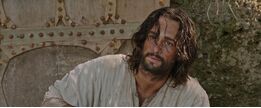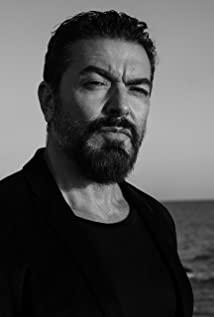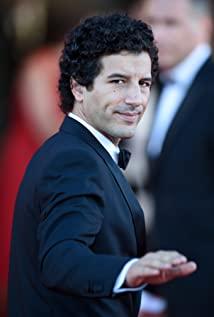This movie can be described as a clear stream in 2016, which is full of bad movies.
Of course, not because it's good. But in the environment where domestic films are rushing to the streets one after another, seeing the American emperor, as a powerful country in the film industry, also ruined the classics by taking a nap, it really made me feel a lot of balance.
The 1959 edition of "Ben-Hur" tells the story of Misala, an ancient Roman tribune who returned to his hometown. In order to maintain his rule over the local Jewish ethnic group, he hoped that his childhood friend Ben-Hur would help.
But Ben-Hur was reluctant to betray his compatriots and break with Misara. Later, Misara found an excuse to treat Ben-Hur's family for treason. Ben-Hur became slaves rowing on the battleship, and his family was imprisoned in a cell.
In a naval battle, Ben Hur rescued the general who was in distress, made military exploits, and was accepted as his adopted son and cleared of the crime. Having regained his freedom, he returned to his hometown to take revenge on Misala by racing chariots in the arena.
In the end, Misala was defeated in the game, and Ben-Hur saw his family in prison, suffering from leprosy. Just when Ben-Hur was overwhelmed, Jesus Christ was crucified by the Romans, and his blood was washed by the rain and into the river, finally healing Ben-Hur's family and reuniting them.
The film actually has two clues, light and dark, through the opening star's revelation and the birth of the Holy Child; <
Picture 5> and the
back of the person who gave the thirsty Benxu water; The vague figure on the post to preach to the Jews who were bullied by the Romans ; Jesus Christ, who will rise as a new culture, will eventually replace the dark line of the brutal Roman culture and bury it in the bright line of Ben-Hur's revenge against Misala. The whole plot is full of thick, vicissitudes of epic sense.
In contrast, the new version of "Ben-Hur" is based on the principle of reducing complexity and simplicity, and finally presents a picture of "the great love in the world has only the foundation".
First of all, it removes the entire religious clue and turns it into a simple revenge story, but the motive of revenge is unclear.
Perhaps the director felt that it was difficult for today's audience to be persuaded by flat characters, so he created the "excusable" Misala and the Ben-Hur family with a certain "self-inflicted" factor.
At the beginning of the film, in the 59th edition, it starts with Misala returning home. Through the transformation of his relationship with Ben-Hur, he tells the straight-to-the-point narrative of grievances and grievances. The Romans, Misala, were "looked differently" because of cultural and religious differences.
In the 59th edition, the important turning point that led to the condemnation of the Ben-Hur family was that Ben-Hur's younger sister Tilsa accidentally knocked off the tile while watching the Roman Governor's parade on the roof, injuring the Governor. . Misala just seized this opportunity to set an example, shocking the anti-Rome Jewish fanatics with the fate of the noble Ben Hur, thus securing the seat of the Roman tribune.
In the new version, Ben-Hur took in the injured fanatic, so that the Roman governor was attacked by the fanatic when he was on tour. The governor wanted to execute the Ben Xu family, and Misala was forced to execute the sentence under pressure.
In contrast, the new version of Misala's character stance is very awkward - neither like the tribune who has won a high position in the Roman Empire, nor like Ben Hur's affectionate "bare-ass brother". The audience neither loves nor hates it. This makes Ben Hur's revenge not recognized by the audience.
It is difficult to bring emotions into it, and the change of roles is baseless-why did Misala, who was forced to execute under pressure, forget the former brotherhood in a blink of an eye, and want to kill herself in the arena? Why is it that after defeating the injured Misala, just yelling at Ben Hur for a few times, the two of them were able to write off all the previous grievances and cry together?
I can't really find any other reasonable explanation other than the reason.
Second, some of its revenge powers are too weak.
In the 59th edition, Ben Hur experienced the bitter life of a rowing slave, and survived with the firm belief of revenge
;
Son, cleared of the crime, can enjoy all the glory, but he still resolutely returned to his hometown to seek revenge;
on the way back to his hometown, he encountered an Arab businessman who liked to bet on the arena. Under his suggestion, he chose to take revenge on Misala by participating in the racing car.
However, in the new version of the movie, all of this is not expressed, allowing Ben-Hur to escape directly from the naval battle. Then he was rescued by the African businessman played by Morgan Freeman, showing his talent for driving a carriage, and he directly launched the revenge drama.
Not to mention, the contradiction at the core of "revenge" that the film has painstakingly constructed is easily resolved, weakening the original powerful impact of the "revenge" stalk. I just have one question -
the Arab businessman in the 59 edition helps Ben Hur partly because it is profitable - he likes to bet on the arena, he has the best horses and as long as he has a first class driver he can make money On the other hand, it was because Arabs
and Jews shared a common emblem of faith and were oppressed by the Romans. So it makes sense.
But in the new version, what the hell is the plot of an African businessman who is willing to bet with all his financial resources for Ben-Hur without any bargaining and common interests, against the Romans?
If it wasn't because Morgan Freeman played God, then it can only be said that it was the love between the African businessman and Ben Hur, the great love!
Finally, it is the details when it implements revenge, which is too sloppy to portray.
In version 59, the chariot driven by Misara was a chariot -
on the one hand, it highlighted the strength of the Roman Empire, and Misara's "unscrupulous" character, on the other hand, also gave Misara's war. Cars can crash other competitors' chariots for reasonable reasons.
At the same time, it highlights the dangers of Ben-Hur's revenge in the arena.
But in the new version, Misala, who was driving an ordinary wheeled carriage, could actually easily destroy the opponent's carriage, and he was unscathed, giving people a sense of ignorance.
What's even more powerful is that this carriage, which "was scratched and wounded, touched and died", had intimate contact with Ben-Hur's car several times, but Ben-Hur was safe and sound!
Don't tell me it's because of the protagonist's halo. From the various signs of the new version of the film, I can't help but believe that Misala didn't deliberately let Ben-Hur water, they love too deeply!
A classic movie about religion and history has become a love movie.
"Ben-Hur" was originally a novel by Lou Wallace, full name "Ben-Hur: The Story of Christ". It has been remade into movies several times, and each remake is of great significance to the history of cinema.
In 1907, "Ben-Hur" was brought to the big screen for the first time.
In the infancy of film art, this 15-minute film, in addition to showing the excitement of racing for the first time, also has an important contribution - the
novel author Lou Wallace died two years before the film was released. His family, who lost ownership of the novel, sued the Karen Company for an unauthorized adaptation of Ben-Hur into a movie, and won. Since then, it has opened a precedent for copyright awareness in the film and television industry.
If it weren't for this film, the owners of IP now would have to drink the northwest wind.
In 1925, "Ben-Hur" was once again put on the big screen.
This edition of the film portrays Ben-Hur the closest to the novel's original image, and it is also a hugely popular silent film that has put MGM in the top ranks of the film and television industry.
It is a pity that the appearance of the first Oscar was 4 years later than this film. Otherwise, it is bound to become the first legend to take all of the golden man.
"Ben-Hur" in 1959 finally made up for this regret.
It has become the film with the most Oscars in film history, winning 11 awards including Best Picture, Best Director, Best Adapted Screenplay, and Best Actor/Supporting Actor.
Even so far, only "Titanic" and "The Lord of the Rings: The Return of the King" have two award-winning films that can match it.
And this time the adaptation, although there are 3D technology to realistically present the passages of naval battles and racing cars, and there are powerful casts joined by Toby Kebbell and Morgan Freeman, but in terms of its influence, I am afraid it is only Xiangxiang The world has announced that our film and television works have entered an era of no-found love.
View more about Ben-Hur reviews


